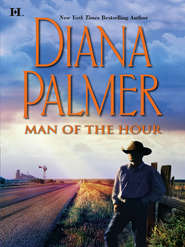По всем вопросам обращайтесь на: info@litportal.ru
(©) 2003-2024.
✖
Lawman
Автор
Год написания книги
2018
Настройки чтения
Размер шрифта
Высота строк
Поля
To Gene Burton,
Our neighbor, our friend
LAWMAN
Contents
Chapter 1
Chapter 2
Chapter 3
Chapter 4
Chapter 5
Chapter 6
Chapter 7
Chapter 8
Chapter 9
Chapter 10
Chapter 11
Chapter 12
Chapter 13
Chapter 14
Chapter 15
Chapter 16
1
THE OLD JACOBS PLACE was in disrepair. The last owner hadn’t been big on maintenance, and now there was a leak in Garon’s study. Right over his damned computer, in fact.
He glared at it from the doorway, elegantly dressed in a gray suit. He’d just arrived in Jacobsville from Washington, D.C., where he’d been taking a course at Quantico on homicide investigation. It was his new specialty, that area of law enforcement. Garon Grier was a career FBI man. He worked out of the San Antonio office, but he’d recently moved from an apartment there to this huge ranch in Jacobsville. His brother Cash was the Jacobsville police chief. The brothers had been alienated for some time. Cash had disowned his family over his father’s remarriage just days after his beloved mother’s death from cancer. That long feud had only just ended. Cash was newly, happily, married to Tippy Moore, the “Georgia Firefly” of modeling and motion picture fame. She had just had their first child, a little girl.
Cash thought the child was the crown jewels. To Garon, she looked more like a little red prune with flailing fists. But as the days passed, she did seem to grow prettier. Garon loved children. No one would ever have guessed it. He had a demeanor that was blunt and confrontational. He rarely smiled, and he was usually all business, even with women. Especially with women. He’d lost his one true love to cancer. It had eaten the heart out of him. Now, at thirty-six, he was resigned to being alone for the rest of his life. It was just as well, he decided, because he had nothing to give to a woman. He lived for his job. He would have liked a child of his own, though. A little boy would be nice. But he had no desire to risk his heart in pursuit of one.
Miss Jane Turner, the housekeeper he’d hired, came into the room behind him, her thin face resigned. “There aren’t any construction people available until next week, Mr. Garon,” she said in her Texas drawl. “We’d best put a bucket under it for now, I reckon, unless you want to climb up on the roof with a hammer and nails.”
He gave her a superior look. “I don’t climb up on roofs,” he said flatly.
She looked him over in the suit. “That doesn’t surprise me,” she muttered, turning to go.
He gave her a shocked look. She must think he never wore anything but suits, when he’d grown up on a sprawling west Texas ranch. He could ride anything with four legs, and he’d won prizes in rodeo competitions in his teens. Now, he knew more about guns and investigation than he did about rodeo, but he could still run a ranch. In fact, he was stocking purebred black Angus cattle here, and he planned to give his father and brothers a run for their money in cattle shows. He had in mind founding his own champion herd sires here. If he could lick the problem of getting qualified cowboys to work for an outsider, that was. Small towns seemed to draw into themselves when people from other places moved in. Jacobsville had less than two thousand people living in it, and most of them seemed to watch Garon from behind curtained windows every time he walked around town. He was surveyed, measured up and kept carefully at a distance for the time being. People in Jacobsville were particular about letting strangers join the family, because that was what they considered themselves—a family of two thousand souls.
He glanced at his watch. He was already late for a meeting with his squad of agents at the San Antonio FBI office, but last night his flight had been unexpectedly delayed in D.C. by a security hitch. It was early morning before the plane landed in San Antonio. He’d had to drive down to Jacobsville, and he’d barely slept. He walked out onto the wide, concrete front porch with its gray floor and white porch swing and white wicker furniture and cushions. Those were new. It was late February, and his housekeeper said they needed someplace for his company to sit when it came. He told her he wasn’t expecting to have any. She snorted and ordered the furniture anyway. She was an authority on everybody who lived around here. She’d probably become an authority on him in short time, but he’d told her graphically what would happen if she dared to pass on any personal gossip about his life. She’d just smiled. He hated that damned smile. If he could have gotten any other spinster lady with her cooking skills to work for him…
He glanced at an old, black car of unknown vintage coughing smoke as it went slowly down the road. That would be the next-door neighbor, whose little green-trimmed white clapboard house was barely visible through the pecan and mesquite trees that separated his big property from her small one. Her name was Grace Carver. She took care of her elderly grandmother, who had a serious heart condition. The granddaughter wasn’t much to look at. She wore her blond hair in a long pigtail, and went around mostly in loose jeans and a sweatshirt. She was shy around Garon. In fact, she seemed to be afraid of him, which was curious. Maybe his reputation had gotten around.
He’d met her when her old German shepherd dog trespassed into his yard. He’d escaped his fenced pen and she came looking for him, apologizing profusely the whole time. She had green eyes, very pale, and an oval face. She was plain, except for her pretty mouth and exquisite complexion. She’d only stayed long enough to make her apologies and introduce herself. She hadn’t come close enough to shake hands, and she’d left as soon as she could, almost dragging the delinquent dog behind her. She hadn’t been back since. Miss Jane had mentioned a week or so later that the old dog had died. Old Mrs. Collier, Grace’s grandmother, didn’t like dogs anyway. Garon remarked that Miss Carver had been nervous around him. Miss Turner told him that Grace was “peculiar” about men. God knew what that meant.
Miss Jane also said that Grace didn’t get out much. She didn’t elaborate. He didn’t ask anything else about her. He wasn’t interested. He liked an occasional night out with an attractive woman, preferably a modern, educated one. Miss Carver was the sort of woman he’d never found interesting.
He checked his watch, closed the front door and climbed into his black Bucar for the drive to San Antonio. He was entitled to use a Bucar—the FBI’s term for a bureau conveyance—even though a new black Jaguar sat in the garage next to his big Ford Expedition. He carried all his gear and accessories in the Bucar. So he drove it to work. It was going to be something of a commute, but no more than twenty minutes either way. Besides, he was tired of apartment living. Miss Turner was astringent, but she was a hell of a good cook, and she kept house without talking his ear off. He considered himself fortunate.
He set off down the driveway, casting a curious glance after Grace’s choking engine. He wondered if she knew that her car had a mechanical problem, and reasoned that she probably didn’t. He glimpsed her from time to time mulching and pruning her roses. She had several bushes of them. That was one thing they did have in common. He loved roses, and during his brief marriage, he’d grown several varieties. It was a hobby he enjoyed, and he had plenty of room to practice it again here at the ranch. Of course, it was February. Not many roses would bloom this time of year.
THE OFFICE WAS BUZZING when he got there. A local homicide detective with San Antonio P.D. was waiting for him, in his office.
“I haven’t even had time to brief the SAC about the workshop, yet,” Garon muttered to the secretary he shared with another agent. “What’s he want?” he added, nodding toward the tall, dark-headed man standing at the window with his hands in his pockets and his black hair in a long ponytail, even longer than the one Garon’s brother Cash, wore. It designated a renegade.
“Something about an abducted child case he’s working on.”
“I don’t do missing person cases unless they end as homicides,” he reminded her.
She gave him a knowing look. “I work here,” she pointed out. “I know what you do.”
He glared at her. “Don’t get smart.”
“Don’t get snippy,” she shot back. “I could be making twenty dollars an hour as a plumber.”
“Joceline, you can’t even put a washer in a faucet,” he replied patiently. “Or don’t you remember what happened when you tried to fix the leaky one in the women’s restroom?”
She pushed back her short, dark hair. “The floor needed mopping anyway,” she told him haughtily. “Now, if you want to know what Detective Marquez wants, why don’t you go and ask him?”
He sighed irritably. “Okay. How about a cup of coffee?”
“Already had one, thanks,” she said. She gave him a smile.
“I hate liberated women,” he grumbled.
“Gee, can’t you lift a coffee cup all by yourself?” she asked with mock surprise.
“When you come asking for a raise, see what happens,” he said.
“When you want a case report typed, see what happens,” was the smug reply.
He muttered in gutter Spanish all the way into his office. He hoped Joceline understood every single nasty word. But if she did, she didn’t let on.











